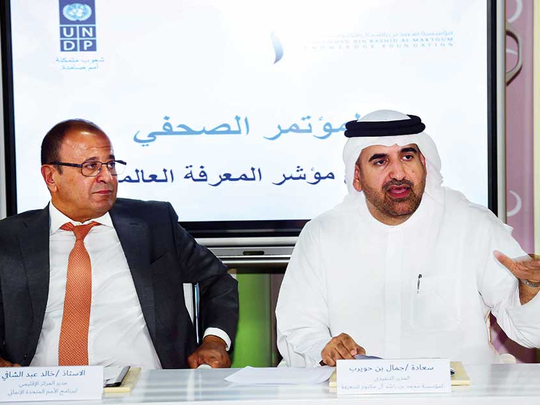
Dubai
A new global index has been launched in Dubai to measure the knowledge sector in more than 100 countries, officials said on Sunday.
To be available in November, the Global Knowledge Index, considered the first of its kind in the world, was launched by the Mohammad Bin Rashid Al Maktoum Knowledge Foundation (MBRF) in partnership with the United Nations Development Programme (UNDP).
The new index will map trends in six diverse areas of knowledge and will serve as a platform to flag opportunities and challenges facing nations by producing accurate and objective data for governments and authorities.
“The Global Knowledge Index is a gift from Dubai to the world, said Jamal Bin Huwaireb, MBRF CEO. “It will work to gauge the current realities of the knowledge sector in around 140 nations in order to supply experts and decision makers with accurate data that supports their strategies and developmental policies.”
Bin Huwaireb said the tool includes six sectoral indices such as pre-university education, technical vocational education and training, higher education, information and communications technology, economy and scientific research and innovation.
Following the two editions of the Arab Knowledge Index, which provided regional countries details on similar pillars, the Global Knowledge Index will work similarly, but will allow the Arab world to compare itself with other nations worldwide and exchange expertise, Bin Huwaireb said.
“With the rapidly accelerating knowledge revolution, it is crucial to be fully engaged with what is happening around us, he said, noting that the MBRF and UNDP has set up a cross-continental team of experts and specialists to oversee the new index, and to ensure that it operates along a well-researched methodology.
Speaking on the sidelines of the press conference, Dr Yousry Al Jamal, Information and Communication Technology adviser for the new index said the team is consulting other influential bodies to collect credible data, such as the Unesco Institute for Statistics, the International Telecommunication Union (ITU), and International Association for the Evaluation of Educational Achievement.
“Many researches are waiting for the details of the index, including governments, because knowledge is the base of a nation’s economy,” said Dr Jamal. “The index will show them their status within the world, and as they go through the details, they will get to know which of the six pillars they are excelling in and the areas that require improvement.”
Dr Jamal mentioned that in the coming index, details such as the ranking of universities worldwide according to international measures will be available, which will help universities work more on qualities to improve their rank.
“In the Arab Knowledge Index, the UAE parameters were almost the highest in the Arab World, however it was important for the UAE to be able to compare itself to Europe, US and Japan. This is the ambition of the UAE who always excels and looks for an international position not just regional,” he said.
Before the launch of the Arab Reading Index, there was a lack of credible and reliable international data available about the reading habits of people in the Arab world, said Bin Huwaireb.
“The numbers published before did not give justice to the amount of reading that was made in this region,” he said. “It was found that Arabs are actually avid readers when we decided to launch the Arab Reading Index, unlike what was earlier published in data.”








